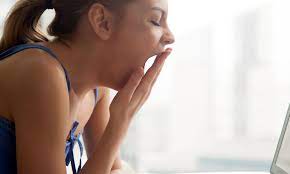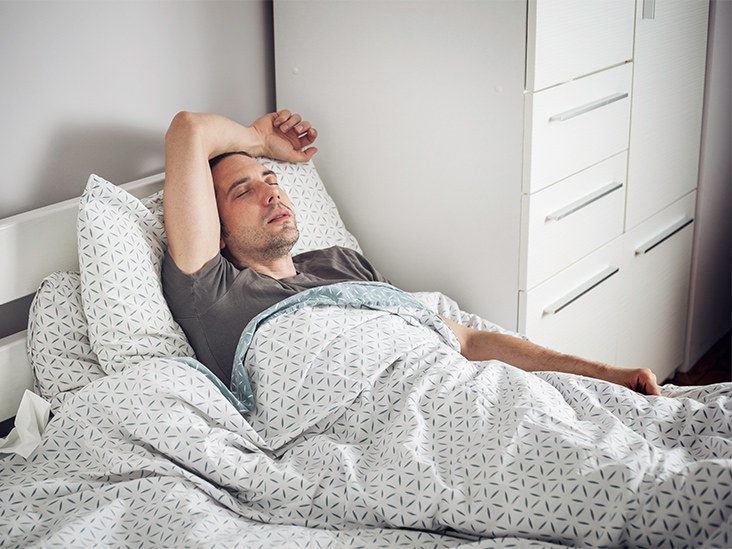Did you know that sleep deprivation is a public health epidemic? It’s true! According to the Centers for Disease Control and Prevention, more than one-third of adults in the United States don’t get the recommended amount of sleep. This is a huge problem because sleep deprivation can lead to all sorts of health problems. In this blog post, we will discuss the terrible reality of sleep deprivation and how it can affect your life. We will also provide some tips on how to get more sleep.
Contents
What Does Sleep Deprivation Means?
 Sleep deprivation is a condition that occurs when a person fails to get enough sleep. The condition can be acute, which means it lasts for a short period of time, or chronic, which means it persists for a long time.
Sleep deprivation is a condition that occurs when a person fails to get enough sleep. The condition can be acute, which means it lasts for a short period of time, or chronic, which means it persists for a long time.
Furthermore, it is defined as any partial or total lack of sleep, whether voluntary or involuntary. Therefore, sleep deprivation can be caused by a variety of factors, including medical conditions, work schedules, stress, or poor sleep habits.
Signs Of Sleep Deprivation
There are various signs that show a person is sleep-deprived. Some are physical, some mental, and others emotional.
Physical signs of sleep deprivation
- Yawning or rubbing the eyes excessively
- Feeling tired or drowsy during the day.
- Having difficulty concentrating or paying attention.
- Being irritable or cranky.
- Having trouble falling asleep at night
Mental signs of sleep deprivation
- Feeling anxious or stressed
- Having racing thoughts
- Being unable to think clearly
Emotional signs of sleep deprivation
- Feeling overwhelmed.
- Feeling moody or depressed.
- Becoming easily irritated.
- Having trouble controlling emotions.
If you’re experiencing any of these symptoms, it’s important to see a doctor to rule out any underlying health conditions. Once you’ve ruled out a medical cause, there are still things you can do to help improve your sleep.
What Causes Sleep Deprivation?
 When talking about sleep deprivation, it’s important to understand the root of the problem. In most cases, sleep deprivation is caused by an imbalance in our daily lives.
When talking about sleep deprivation, it’s important to understand the root of the problem. In most cases, sleep deprivation is caused by an imbalance in our daily lives.
We may have too much to do and not enough time to do it, which can lead to stress and anxiety. This can make it difficult to fall asleep at night and stay asleep throughout the night. Other causes of sleep deprivation include:
- Poor sleep habits: If you don’t have a regular sleep schedule or if you often go to bed late and wake up early, you’re more likely to experience sleep deprivation.
- Medical conditions: Some medical conditions can cause insomnia or disruptive sleeping patterns that lead to sleep deprivation. These include conditions like depression, anxiety, and sleep apnea.
- Side effects of medications: Certain medications can cause insomnia or make it difficult to stay asleep. These include some antidepressants, blood pressure medications, and allergy medicines.
- Caffeine: Drinking caffeine late in the day can make it harder to fall asleep at night.
- Alcohol: Although alcohol may make you feel sleepy, it can actually disrupt your sleep and cause you to wake up frequently throughout the night.
If you’re experiencing any of these causes of sleep deprivation, there are things you can do to get more restful sleep.
Effects Of Sleep Deprivation In Your Life
There are several effects of sleep deprivation in your life. These effects are;
Health Issues
- Immune System – When you don’t get enough sleep, your immune system doesn’t work as well. You’re more likely to get sick.
- Physical Health – Not getting enough sleep can lead to a heart attack, stroke, or diabetes. It can also cause weight gain and increase your risk for accidents.
- Weight Gain – When you’re sleep-deprived, your body produces more of the hormone ghrelin. This hormone makes you feel hungry. You’re also more likely to make poor food choices when you’re tired.
- Poor Food Choices – When you don’t get enough sleep, you’re more likely to crave unhealthy foods. You might reach for sugary or fatty foods instead of healthy options.
- Anxiety and Depression – Sleep deprivation can worsen anxiety and depression symptoms. If you’re already struggling with these conditions, you might find that it’s harder to cope when you’re not getting enough rest.
Concentration Issues

- Increased risk of accident – When you’re tired, you’re more likely to make mistakes. This can lead to accidents at work or at home.
- Trouble making decisions – When you’re sleep-deprived, you might have trouble thinking clearly. You might have trouble making decisions or solving problems.
- Memory problems – Not getting enough sleep can cause memory problems. You might have trouble remembering things that happened recently or long ago.
Long Term Complications
There can be some long-term complications with sleep deprivation. These effects are;
- Hypertension
- Sleep apnea
- Dementia
- Cognitive decline
- Diabetes
- Strokes
- Heart disease
The effects of sleep deprivation can be serious and innumerable. It’s important to get enough sleep to protect your health and well-being. And, if you think you may be suffering from sleep deprivation, talk to your doctor. They can help you identify the cause and find a solution.
Do not make the mistake of thinking that you can function well on less than eight hours of sleep. Your body needs sleep, just like it needs food and water. Consider your sleeping habits and make sure you are getting the recommended seven to nine hours of sleep each night.
When To Get Help?
There are a few different ways to measure sleep deprivation, but one of the most common is the Epworth Sleepiness Scale. This scale rates your chances of falling asleep during eight different activities, from watching TV to driving. If you score a ten or higher on this scale, it’s likely that you’re suffering from sleep deprivation.
It is important to seek help when sleep deprivation is starting to affect your everyday life. If you’re struggling to get enough sleep, talk to your doctor and see if there are any underlying health conditions that could be causing your insomnia. There are a few different ways to treat sleep deprivation, so don’t hesitate to ask for help.
In addition, before the situation gets worse, it would be best to consult a professional. In fact, sleep deprivation can have a significant effect on your mental and physical health. It can cause anxiety, depression, and even hallucinations. If you’re struggling to get enough sleep, then do not hesitate to seek help. It is important to control the situation.
Treatment Options

When you realize that you might be suffering from sleep deprivation, it is important to seek medical help, and other options as well. Find what works best for you. There are treatment types, such as;
Therapy To Treat Sleep Deprivation
Therapies available to treat sleep deprivation include:
Cognitive-behavioral therapy. This type of therapy can help you identify and change any beliefs or behaviors that might be interfering with your ability to sleep.
Stimulus control therapy. This type of therapy helps to establish regular sleep patterns and break any unhealthy associations you have with your bed and bedroom.
Sleep hygiene education. This involves learning about healthy sleep habits, such as sticking to a regular sleep schedule, maintaining a comfortable sleep environment, and avoiding caffeine before bedtime.
Relaxation techniques. These can help reduce stress and anxiety that might be interfering with your ability to sleep. Relaxation techniques include things like progressive muscle relaxation, deep breathing exercises, and meditation.
Prescription Medications To Treat Sleep Deprivation
When sleep deprivation is caused by another underlying condition, such as sleep apnea or depression, your doctor may prescribe medication to treat that condition. This can help improve your sleep.
There are also medications that can be used specifically for sleep. These include:
- Zolpidem (Ambien)
- Eszopiclone (Lunesta)
- Ramelteon (Rozerem)
- Zaleplon (Sonata)
There are also some over-the-counter medications that can be used to treat sleep deprivation. These include:
- Diphenhydramine (Benadryl)
- Doxylamine succinate (Unisom)
- Melatonin
Self-Care Techniques
 This is not an all-inclusive list, but some self-care techniques that might help you get more sleep include:
This is not an all-inclusive list, but some self-care techniques that might help you get more sleep include:
Stick to a regular sleep schedule. Go to bed and wake up at the same time every day, even on weekends.
Create a relaxing bedtime routine. This can involve things like taking a warm bath or shower, reading a book, or listening to calming music.
Avoid caffeine before bedtime. Caffeine can stay in your system for six hours or longer and interfere with your sleep.
Limit alcohol before bedtime. Alcohol may make you feel sleepy at first, but it will disrupt your sleep later in the night as it is metabolized.
Get regular exercise. Exercise can help improve your sleep by reducing stress and anxiety and promoting relaxation.
Practice yoga and meditation. This is of great help in keeping our mind and body relaxed. It helps in calmness and concentration as well.
There are many different treatment options available for sleep deprivation. You can talk to your doctor to find out which option is best for you. There are also self-care techniques that you can try to help improve your sleep. If you have trouble sleeping, don’t suffer in silence.
There are many resources available to help you get the treatment you need to get a good night’s sleep. Because a good night’s sleep is important for your overall health and well-being.
Tips To Get More And Better Sleep
Other than treatment, there are a few things you can do to get more and better sleep. Some of the tips are;
- Follow a routine before bed and avoid watching television or working on the computer in the hours leading up to sleep.
- Establish a regular, relaxing bedtime routine including winding down for 30 minutes before sleep.
- Keep a cool, comfortable environment in your bedroom for sleeping.
- Reserve the bed for sleep and sex and create an environment that promotes relaxation.
- Use comfortable sheets and limit noise and light exposure in the bedroom.
If you have trouble sleeping, don’t suffer in silence – speak to your doctor about it. They may be able to recommend some changes to your lifestyle or prescribe medication if necessary.
Sleeping well is essential for good physical and mental health so make sure you get enough shut-eye!
Conclusion
To wrap up, sleep deprivation is a very real issue that can have profound effects on our health, well-being, and quality of life. However, there are many things that can be done to improve your sleep habits and quality of sleep.
Sleep deprivation should not be taken lightly. In fact, it should be taken very seriously. If you think you may be sleep-deprived, please talk to your doctor and get some help. There are many things that can be done to improve your sleep habits and quality of sleep, so don’t hesitate to ask for help if you need it. Thanks for reading!
A Word From Therapy Mantra
Your mental health — Your psychological, emotional, and social well-being — has an impact on every aspect of your life. Positive mental health essentially allows you to effectively deal with life’s everyday challenges.
At TherapyMantra, we have a team of therapists who provide affordable online therapy to assist you with issues such as depression, anxiety, stress, workplace Issues, addiction, relationship, OCD, LGBTQ, and PTSD. You can book a free therapy or download our free Android or iOS app.


